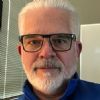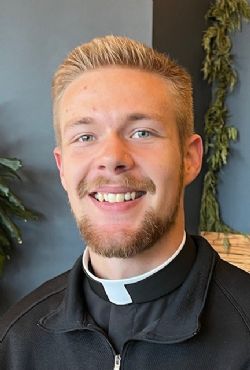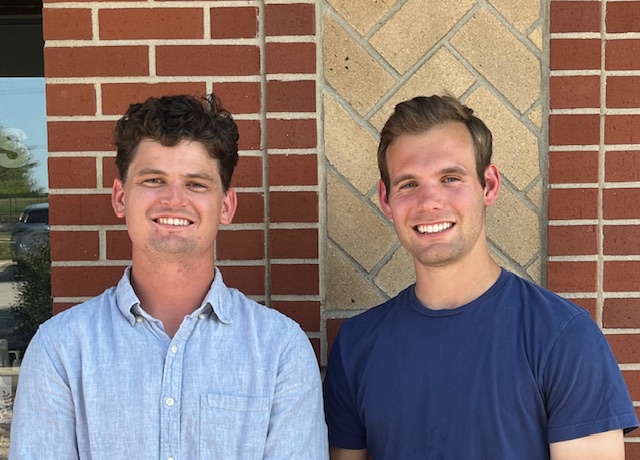 As cicadas echoed their familiar late summer audibles in the background, I had a chance to connect with Andrew Buyle (R) and Zach McGuinness (L) at a local coffee shop on a recent Sunday mid-afternoon, to get to know them and hear their vocations stories. The two men spent their summer together at Corpus Christi Parish in Lawrence, KS, working with Prayer in Action.
As cicadas echoed their familiar late summer audibles in the background, I had a chance to connect with Andrew Buyle (R) and Zach McGuinness (L) at a local coffee shop on a recent Sunday mid-afternoon, to get to know them and hear their vocations stories. The two men spent their summer together at Corpus Christi Parish in Lawrence, KS, working with Prayer in Action.
I crossed paths with the two of them at Fr. Aaron Waldeck's ordination reception in late May, and they graciously agreed to meet me later in the summer. In the blink of an eye, "later in the summer" arrived.
"I was the work sites manager," Buyle led off in response to a question about their experience with Prayer in Action, "and Zach was the tools manager." It turns out that fellow seminarian, Landry Weber, was the team lead. "We worked very closely together." The fourth member of their seminary class, Jarrad Condreay, was unable to participate as he spent the summer recuperating from a broken leg as a result of a late spring skiing accident before returning to Kansas City.
The two men were very engaging as they spoke of their experience with area youth, tackling service projects for folks who otherwise might have gone without needed help.
Buyle and McGuinness did not know each other before seminary. Zach grew up and finished high school in Los Angeles, CA, before venturing to the midwest to attend KU. Two of his older siblings, a brother and a sister, had graduated from KU (and become FOCUS missionaries); it seemed reasonable to him to follow in their footsteps. His grandparents are from Kansas City, MO, and also graduated from KU. We had an immediate connection with his revelation of his Jayhawk affinity.
Andrew Buyle
Andrew quickly pointed out that he is a K-State grad, and a K-State fan, which, of course, didn't diminish the author's esteem for him as he shared his story.
"Seminary wasn't really on my mind growing up," Andrew related. A scripture passage from Matthew's gospel has been a big part of his journey: "Whoever finds his life will lose it, and whoever loses his life for my sake will find it." (Mt 10:39). He related that the family went to Mass on Sundays, and credits the way his parents raised the family as cornerstones of his vocational call.
"My priorities in college were academic and getting a good job when I graduated," he said,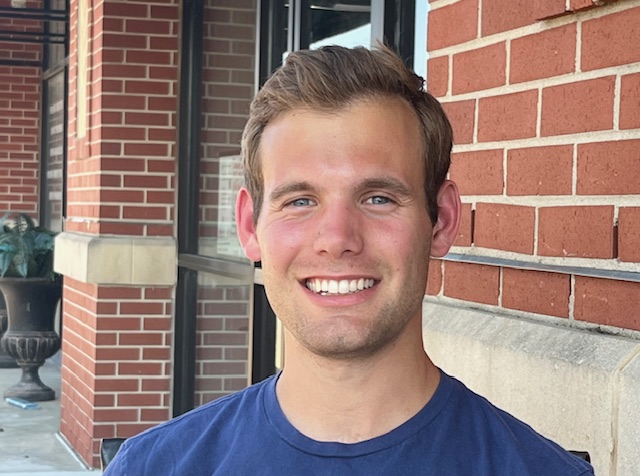 adding, "I was the president of my fraternity, which was one of my goals." He acknowledged the feeling of emptiness present, "even though I had all these things."
adding, "I was the president of my fraternity, which was one of my goals." He acknowledged the feeling of emptiness present, "even though I had all these things."
Buyle (photo right) recalled an encounter with a FOCUS missionary who had spoken about SEEK (the annual FOCUS event that happens in January in which 15,000 + Catholic students from college campuses across the country gather for a week of friendship, prayer, and learning more about the Catholic faith). He related that a friend had invited him, but he didn't feel compelled to attend. He recalled the FOCUS missionary having "a joy about her" that he desired. During his SEEK encounter at the start of his second semester of his senior year at college, he received the Sacrament of Reconciliation, "for the first time in about seven years," and had a powerful encounter with the Lord at the time.
"I told the Lord that I would go wherever He called me to go." He quickly added an afterthought he recalled at the time, "There is no way God is going to call me to be a priest."
He won the job of his dreams with an engineering firm and found himself increasingly drawn to the priesthood. "I realized I wanted to bring people to the Sacraments, especially the Sacraments of Reconciliation and the Eucharist." His spiritual director at the time instructed him to do two things: 1) buy and read a book called, "What Does God Want?" by Fr. Michael Scanlon; and 2) set up a meeting with the Vocations Director, Fr. Dan Morris, before their next meeting.
A chance meeting with a girl (at a K-State football game in Dallas,TX) might have derailed his discernment process, except for that scheduled meeting with Fr. Dan Morris, who clarified the impossibility of a dating relationship while discerning the priesthood.
When offered a two-year field assignment "out in the middle of nowhere Kentucky," he experienced another tension. He described a field assignment as requisite for career advancement. "I was leaning toward yes in taking the field assignment," he said. On a Friday, he recalled praying the Rosary, saying the Sorrowful Mysteries. "And when it came time for the 5th Sorrowful Mystery, the Crucifixion and Death of Our Lord, I thought about how the Eucharist is the living gift of the sacrifice that Jesus made on the cross, and about how He gave His whole life for me, for my sake, and for the sake of the whole world. I felt like, if I were to give my life completely to Jesus, I would not take this field assignment. And so, after that reflection, I discerned that I probably shouldn't accept it."
It was at this point that he again referenced Matthew 10:39. In his words, "He who loves his life will lose it, but He who loses his life for My sake, will find it." He recalled thinking when he was younger that, if he were to live out that verse, he would be a priest. "It meant the priesthood for me."
"I'm really indecisive, so I started praying for clarity, asking the Lord to make it very clear that I was to go to seminary."
Clarity soon came. As many who have prayed for clarity can testify, the Lord often responds swiftly. In a subsequent call with the woman he'd met in Texas, she informed him that she did not see the relationship working in the long term. "I thought I'd feel sadness. I was a bit disappointed, but I felt free."
Matthew 10:39 surfaced in a subsequent Mass experience, as the Communion Antiphon, though Buyle was a bit surprised when it was read. He explained that, later, when he retired to the Adoration Chapel to journal his experience, he did a bit of research and discovered that Matthew 10:39 - "Whoever finds his life will lose it, and whoever loses his life for my sake will find it." - was, in fact, among the prescribed options for the Communion Antiphon, though not the option he anticipated based on what was printed in his Magnificat for that day. Buyle concluded by sharing his thought at that moment: "How much clearer can you be, Lord?"
His parents knew he was thinking about the seminary, and Andrew described his eventual decision as something of a whirlwind for his parents, given that he was considering the work field assignment and had met the girl at a KSU football game in Texas.
"My parents have always been supportive of me going to the seminary," he reflected. "My mom had more questions," he said, relating some difficulty in accepting that, with Andrew being the only son in the family, there would be no Buyle grandchildren to continue the family name.
As seminary life has unfolded, he commended his mom's transformation - indeed, his parents' transformation, as they have visted the seminary, gotten to know other seminarians, and learned about the process known as 'discernment.' Andrew spoke of his gratitude to his parents, Kristy and Mark Buyle, for their support of his decision, despite their initial unfamiliarity with it.
Zach McGuinness
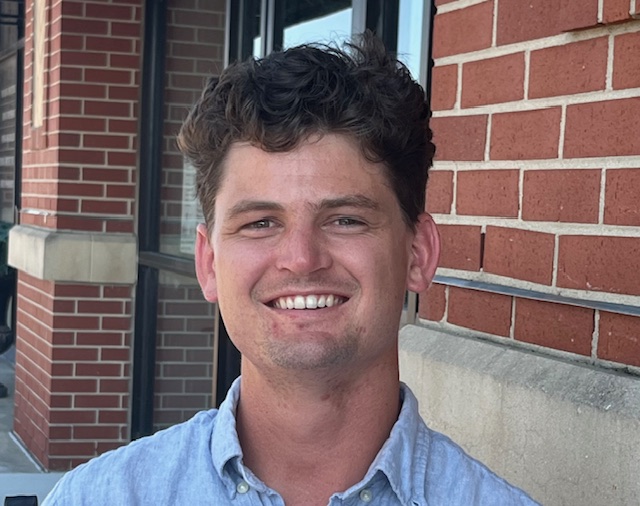 "I grew up in a Catholic family in Los Angeles," Zach began, adding, "Catholicism there is very different." He acknowledged his family's attendance at Sunday Mass, but indicated that beyond Sunday Mass, he wasn't catechized.
"I grew up in a Catholic family in Los Angeles," Zach began, adding, "Catholicism there is very different." He acknowledged his family's attendance at Sunday Mass, but indicated that beyond Sunday Mass, he wasn't catechized.
"It's kind of a miracle that I had two older siblings who both went to KU with no faith and both left as FOCUS missionaries," he said, in reference to an older brother and an older sister who had become Jayhawks before him. Their total conversions in their college experiences had a big impact on Zach in his middle school and high school years.
"I had one thought of the priesthood in my first 20 years," McGuinness continued, "when I was 12 years old. I was watching the priest deliver his homily on a Sunday morning, and all I could think was, 'I could never live a life that boring.'"
"Once I got to KU and I met Catholics who were living out their faith well, I experienced a big shift," he added. Initially away from home, he drifted away from Mass even on Sundays during his first semester at KU. In the spring semester of that year, his older siblings, who had remained involved in the St. Lawrence Center, would invite him to Mass and to functions, "and I would just reject them over and over." "I remember going to a retreat during that second semester, and on that retreat I went back to confession for the first time in three years."
He related that this was the very retreat that provided the spark for each of his siblings in their KU experience and admitted that he did feel some pressure at facing what he called "the playbook": a sense of obligation at rising to the occasion. He used the word "relief" to describe his experience with confession saying, "the pressure and anxiety were all relieved," and noted, "that was when the real conversion began."
Involvement in the St. Lawrence Center began and a year later, during the spring semester of his sophomore year, he committed to join a FOCUS mission trip to Peru. During that trip, he recalled, "On one of our off days a group of us were walking through a monastery that had become a museum, and one of my friends ask me if I'd ever thought about becoming a priest. I said, 'No because that thought is terrifying.' And he said, 'Me, too.'" And they never talked about it again.
"That was right about the time I was learning how to pray, and I began to try to pray daily," he said. The question of priesthood and a future vocation as a priest kept nagging at him. During the following summer, he recalled a Nigerian priest at his home parish in Los Angeles, whom he described as a very holy man and a very good role model. He practiced weekly confession, recalling very strong consolation and peace that accompanied each confession experience.
"When I was in the confessional with this Nigerian priest, I thought about being on the other side (of the screen) as he was sharing words of encouragement with me, and that was the first moment of excitement towards the priesthood," he reflected. "I imagined my yes and being able to give the peace that I'd received in confession to other people."
Nonetheless, McGuinness described a persistent feeling of resistance.
He spent his junior year at KU praying his way through the doubt and the fear of a priestly vocation, again reflecting, "The decision wasn't something that I did on a whim."
"One of my friends outed me to Fr. Dan," Zach shared, indicating also that he was pretty annoyed (he used other words) at this development. The friend was scheduled to go Quo Vadis, the annual archdiocesan retreat for young men with questions about a priestly vocation that occurs in December and, unable to attend, suggested to Fr. Dan Morris that he invite Zach. "It was all good in the end but, at the time, I just wasn't ready for it."
"I had one meeting with Fr. Dan, left with three books and an invitation to Quo Vadis," McGuinness laughed.
McGuinness worked a summer camp in Colorado that summer. While he described difficulty with personal discernment while there, he added that there were a few seminarians there with whom he was able to discuss vocational discernment in the seminary. He returned to KU for the fall semester of his senior year and informed his spiritual director that he was as confident as he would ever be that he was called to the seminary.
Attracted to the Dominican order, he recognized he was faced with yet another decision: the life of a priest in a religious order or as a diocesan priest. He recalled his spiritual director telling him that God had spoken and now it was up to him to act, instructing him to make a call to the Dominicans or ask Fr. Dan for an application to diocesan seminary. He did neither.
"I was going back for my next spiritual direction," he continued, "and I was, like, 'Oh no. I didn't do what I was asked to do. I didn't do my homework.'" He said he made up some excuse and added, "I felt like a kid in grade school caught without my homework assignment."
"Mom, can you call me out?" Buyle interjected here, amid laughter all around.
Through a subsequent encounter with his younger sister who was by now a sophomore at KU and a flower she gave to him, McGuinness met St. Therèse of Lisieux in prayer on her feast day. "I'd never really had a connection to any of the saints," he said. He related his thought at the time about all of this being nothing more than coincidence.
He spoke about a subsequent confession with Fr. Mitchel (Zimmerman) in which he was given for his penance the instruction to pray with Romans 12:1-2.
I urge you therefore, brothers, by the mercies of God, to offer your bodies as a living sacrifice, holy and pleasing to God, your spiritual worship. Do not conform yourselves to this age but be transformed by the renewal of your mind, that you may discern what is the will of God, what is good and pleasing and perfect.
After reading it once, he knew he needed to obtain an application to seminary. He entered seminary in the fall of 2022, after completing his degree in accounting at KU that spring.
Zach is the fifth of six children in his family. His parents, Mike and Gina McGuinnes, live in Los Angeles. He described a very positive response from his parents when he broke the news about entering seminary. He believes his older siblings had broken the ice with their college conversions. He also identified that his parents had undergone their own deepening of their faith lives and relationships with Jesus.
The Wrap
We talked about the non-existence of coincidence in the lives of the saints. When I asked about favorite saints, Andrew quickly identified St. Maximilian Kolbe (whose feast day was celebrated in the Church this past week!) and Kolbe's importance in his conversion experience.
Zach first spoke about his confirmation saint, St. Patrick. His four "go-to" saints are St. Therèse of Lisieux, St. John of the Cross, St. John Paul II, and St. John the Beloved.
When asked about favorite scripture quotes, Buyle returned to Matthew 10:39, "Whoever finds his life will lose it, and whoever loses his life for my sake will find it." Another favorite is John 8:12. "Once you take up a life with Jesus, you will always have the Light of Life." McGuinness again offered Romans 12:1-2, referenced above.
When I asked about words of wisdom for individuals considering a priestly or religious vocation, Zach quickly responded, "We got this question a lot anonymously at Prayer in Action this summer." He gave the following advice:
- Pray every day. You'll know what to do.
- Receive the Sacraments regularly. The Sacraments are fuel for the journey, wherever it takes you.
- Notice what's happening in conversations about your considerations. Be aware of how you talk about the process of figuring out what it is that God wants of you.
Buyle mentioned the book, "To Save a Thousand Souls," which he described as a guide for vocational discernment. He added:
- Pray three Hail Marys every day for your vocation. Prayer is the biggest part of the process.
- Talk to a priest or someone who has knowledge greater than yours.
- Set up a meeting with the Vocations Director.
I noted that the day of our conversation was the Feast of St. John Vianney, the patron of parish priests, and I wished them both a happy feast day.
I glanced at my watch and realized I'd kept these two young men for an hour and a half by this time. Good grief! They were so very gracious with their time! I asked if there was anything else that either wanted to offer in closing.
"I think one of the things this summer that kids asked about the seminary involved questions about prior misconceptions and anything unexpected in the experience," Buyle observed, as he spoke of the pressure, particularly in the way of family expectations, that sometimes accompanies the decision to enter seminary. "People think that because you've entered seminary you're destined to be a priest." He related his effort to help the youth understand that seminary life is a process, the final outcome of which occurs only with time and prayer, whether it culminates in an ordination or in the realization that God is calling one to another way of serving Him. Sometimes it happens that, in the discernment experience of seminary life, one learns he is called to something other than a priestly or religious vocation, and that is good. The discernment process makes the eventual vocational commitment, whatever it is, much more solid.
Zach offered (and Andrew quickly chimed in!) thanks to Serrans for the support, both prayer and financial support provided to the seminarians. "It makes a tremendous impact," they both observed.
Let us pray for Zach and Andrew, and all their seminary brothers, as they begin their new year of seminary studies!

